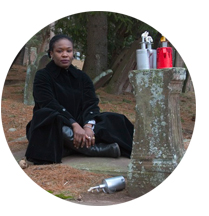| Sun | Mon | Tue | Wed | Thu | Fri | Sat |
|---|---|---|---|---|---|---|
| 1 | 2 | 3 | 4 | 5 | ||
| 6 | 7 | 8 | 9 | 10 | 11 | 12 |
| 13 | 14 | 15 | 16 | 17 | 18 | 19 |
| 20 | 21 | 22 | 23 | 24 | 25 | 26 |
| 27 | 28 | 29 | 30 | 31 |
CATEGORIES
RECENT ENTRIES
BLOG ROLL
Elegy and exhortation
 A year ago a tremblement de terre violently shook Haiti, the world, and Gina Athena Ulysse.
A year ago a tremblement de terre violently shook Haiti, the world, and Gina Athena Ulysse.
Ulysse, a Haitian native who spent the last week of January as artist-in-residence at the University’s Center for the Study of Race, Politics & Culture, commemorated the tragedy with a Court Theatre performance of her dramatic monologue, Because When God is Too Busy: Haiti, Me and the World.
Weaving personal and Haitian history into songs and stories, the hour-long piece brought attention to Haiti’s troubled past and uncertain future. Lists of historic dates, events and statistics flew through the theater, hurled by this fiery woman with bright, orange hair. Breathless stories were unfolded and haunting voodoo chants were cast about the room.
An associate professor of anthropology, African-American studies, and feminist, gender and sexuality studies at Wesleyan University, Ulysse was born in Petion-Ville, Haiti, and as a teenager joined the Haitian Diaspora, migrating to the United States with her family. She gathers information for her works using “ethnographic collectables,” observing firsthand the subject’s behavior and culture. For this project she used her own stories and a capella songs, written over 20 years ago, as data. She was amazed to discover that these writings were still very relevant to Haiti’s present situation.When the house lights rose at the performance’s end, she announced that she was really more than 31 years old, as her last song suggested, and began taking question from the 50 audience members for almost an hour. When asked what could be done to help Haiti she praised the work of the University of Chicago’s Rising in Solidarity with Ayiti for working to rebuild more than buildings. She feels that many NGOs are only working to solve Haiti’s immediate problems and are not addressing the larger issues that have been over looked for more than a century. She told the audience that she places her hopes on “progressive organizations” in Haiti, who are now struggling for money and manpower as they compete with the giant global relief organizations. Organization she suggests may just constitute another form of colonization.
The evening began in darkness with the chant of “Ready or not. Here I come. You can’t hide. I’m gonna find you and make you want me,” coming from a blackened area somewhere off stage. The night ended with the room aglow in light as she sang one last song.
Lisa Genesen
February 1, 2011
